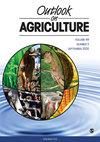Opinion leaders’ influence on knowledge transmission about crop diseases management: Exploring the attributes that matter to followers
IF 2.6
3区 经济学
Q1 AGRICULTURE, MULTIDISCIPLINARY
引用次数: 0
Abstract
Opinion leaders play a significant role in promoting innovation and technology adoption through effective information dissemination to potential adopters. However, personal traits that define effective opinion leaders, as identified in existing literature, may not fully align with followers’ desired attributes of an opinion leader. Additionally, little is known about how varying degrees of influence may impact the spread of knowledge. To bridge the gap, first, we conducted focus group discussions in 10 villages within the banana farming community in Rwanda to assess the critical attributes that farmers seek in opinion leaders. Results indicate that honesty, commitment, social, knowledge, and leading by example are the top five attributes that farmers value the most from an opinion leader for the control of Banana Xanthomonas Wilt – a major banana disease. Second, we collected data from 100 nominated opinion leaders, including 10 farmer promoters, using a structured questionnaire to determine how they transmit knowledge about disease management to farmers. The opinion leaders were categorised into low, medium, and high levels of influence based on pairwise comparison. We found that honesty, leading by example, and justice are significant attributes that distinguish opinion leaders with a higher level of influence and who are more effective in transmitting knowledge. Farmer promoters are not distinct from other opinion leaders in terms of access to farmers but are more active in knowledge transmission than any other opinion leader. Our results suggest that having access to farmers does not indicate influence. Therefore, we recommend engaging those farmer promoters and opinion leaders with a higher level of influence to disseminate information to farmers at the village level.意见领袖对作物病害管理知识传播的影响:探索对追随者至关重要的属性
意见领袖通过向潜在采用者有效传播信息,在促进创新和技术采用方面发挥着重要作用。然而,现有文献中定义有效意见领袖的个人特质可能与追随者所期望的意见领袖特质并不完全一致。此外,人们对不同程度的影响力如何影响知识传播也知之甚少。为了弥补这一差距,首先,我们在卢旺达香蕉种植社区的 10 个村庄开展了焦点小组讨论,以评估农民在意见领袖中寻求的关键属性。结果表明,诚实、承诺、社会性、知识和以身作则是农民在控制香蕉黄单胞菌枯萎病(一种主要香蕉病害)方面最看重意见领袖的五大特质。其次,我们使用结构化问卷收集了包括 10 名农民宣传员在内的 100 名提名意见领袖的数据,以确定他们如何向农民传播病害防治知识。根据成对比较,我们将意见领袖的影响力分为低、中、高三个等级。我们发现,诚实、以身作则和公正是意见领袖的重要特质,这些特质使意见领袖具有更高的影响力,并能更有效地传播知识。农民宣传员在接触农民方面与其他意见领袖没有区别,但在知识传播方面比其他意见领袖更积极。我们的研究结果表明,与农民接触的机会并不代表影响力。因此,我们建议让那些影响力较大的农民宣传员和意见领袖在村一级向农民传播信息。
本文章由计算机程序翻译,如有差异,请以英文原文为准。
求助全文
约1分钟内获得全文
求助全文
来源期刊

Outlook on Agriculture
农林科学-农业综合
CiteScore
5.60
自引率
13.30%
发文量
38
审稿时长
>36 weeks
期刊介绍:
Outlook on Agriculture is a peer reviewed journal, published quarterly, which welcomes original research papers, research notes, invited reviews and commentary for an international and interdisciplinary readership. Special attention is paid to agricultural policy, international trade in the agricultural sector, strategic developments in food production, the links between agricultural systems and food security, the role of agriculture in social and economic development, agriculture in developing countries and environmental issues, including natural resources for agriculture and climate impacts.
 求助内容:
求助内容: 应助结果提醒方式:
应助结果提醒方式:


